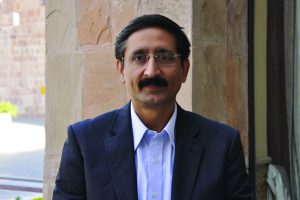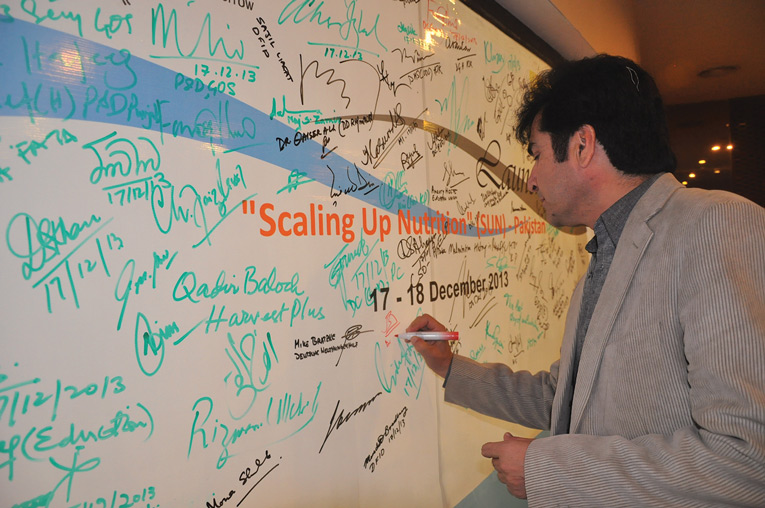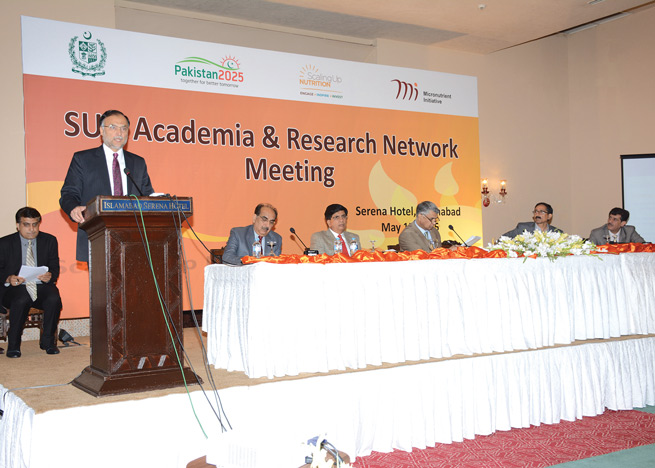Linking academics through a dedicated network in Pakistan
Despite recent economic and technological progress, conditions for children and vulnerable populations remains a serious challenge. They are not getting sufficient amounts of iron, iodine, vitamin A, folic acid and zinc in their diets, causing illness including infections, blindness, mental disorders and an increased risk of morality.
[vc_row row_type=”row” text_align=”left” css_animation=””][vc_column width=”1/2″]

Dr. Tausif Akhtar Janjua, Director, Micronutrient Initiative, Pakistan[/vc_column_text][/vc_column][/vc_row][vc_row row_type=”row” text_align=”left” css_animation=””][vc_column][vc_separator type=”transparent”][/vc_column][/vc_row][vc_row row_type=”row” text_align=”left” css_animation=””][vc_column][vc_column_text custom_options=””]
Background
Despite recent economic and technological progress, conditions for children and vulnerable populations remains a serious challenge. They are not getting sufficient amounts of iron, iodine, vitamin A, folic acid and zinc in their diets, causing illness including infections, blindness, mental disorders and an increased risk of morality.

According to the National Nutrition Survey (NNS) 2011, almost half of Pakistan’s children and mothers suffer from malnutrition. With pregnant women affected by a lack of essential nutrients, their babies are also at risk of disease and death.
Pakistan recognises that addressing malnutrition is key to national development and joined the SUN Movement in April 2013. It has since established a multi-stakeholder platform (MSP) to bring together the different actors in a common space. While a number of different networks have already been established under the SUN Movement, including donors, United Nations agencies, civil society, and business, the academia & research network is still under development.[/vc_column_text][/vc_column][/vc_row][vc_row row_type=”row” text_align=”left” css_animation=””][vc_column][vc_separator type=”transparent”][/vc_column][/vc_row][vc_row row_type=”row” text_align=”left” css_animation=””][vc_column][vc_column_text custom_options=””]
Establishing an Academia & Research Network in Pakistan
Academics play a pivotal role in developing evidence-based guidelines and policies for cost-effective nutrition interventions. The Academia and Research Network in Pakistan is a new initiative launched under the SUN Movement in the country. The Network was conceived and put into practice under the direction of the SUN Government Focal Point, the Micronutrient Initiative and other key stakeholders, including the Higher Education Commission (HEC), which is the central coordinating agency of academic and research institutes. It was formally launched through a kick-off meeting, chaired by the Federal Minister for Planning Development & Reform/ Deputy Chairman Planning Commission. 70 participants from various universities, research institutes, other SUN Networks and the HEC actively contributed.
The Minister urged the newly formed Network to play their part in supporting an enabling environment for formulating effective policies that address malnutrition. The Minister also assured the government’s full commitment to mobilise resources by enhancing budgetary allocations for research and to establish a Centre of Excellence where nutrition research can be carried out. Under the guidance of the SUN Government Focal Point, the Centre will align its actions for nutrition and aim to bridge the gaps through the MSP. Academics and researchers valued the formation of this Network which has uniquely brought the leaders of nutrition together in sharing their expertise and putting it into practice.
The Network aims to promote sustainable improvements in the nutrition status of the people of Pakistan by creating a strong, coordinated and vibrant research and academic forum which will support the implementation of the country’s nutrition agenda. The Network will also facilitate sharing of best practices and nutrition relevant information, advance scientific knowledge and promote knowledge transfer as mandated by the SUN Networks in Pakistan.[/vc_column_text][/vc_column][/vc_row][vc_row row_type=”row” text_align=”left” css_animation=””][vc_column][vc_separator type=”transparent”][/vc_column][/vc_row][vc_row row_type=”row” text_align=”left” css_animation=””][vc_column][vc_column_text custom_options=””]
Key Objectives of the Academia & Research Network in Pakistan:
- To organise the existing research and academic institutions working in nutrition and nutrition- related sectors to maximise their impact and influence on nutrition governance and policies
- To support research that develops the evidence-base for guiding polices in nutrition
- To strengthen members’ capacities in nutrition, food security, research and advocacy
- To establish and sustain links with international research and academic institutions in developing capacities and conducting operational research
- To monitor the implementation and progress of government’s commitments and application of policies in the field, and present the results in a transparent way
- To advocate for the integration of nutrition in the educational curriculum.
[/vc_column_text][/vc_column][/vc_row][vc_row row_type=”row” text_align=”left” css_animation=””][vc_column][vc_separator type=”transparent”][/vc_column][/vc_row][vc_row row_type=”row” text_align=”left” css_animation=””][vc_column][vc_column_text custom_options=””]
Current Challenges
- Bringing together the diverse groups from academia and research institutes despite their different priorities and areas of expertise is challenging
- Most of the policies are formulated on the recommendation of academia and research institutions, however this is done informally as there is no specific forum to coordinate evidence-based policy-making
- There is a lack of an effective strategy on communication and implementation at the national level to ensure efficient utilisation of the existing in-country expertise
- There is a need to bridge the gap in the transformation of successful research into influential policy documents
- There is also a lack of targeted resource allocation to support specific interventions and there is the need to institutionalise allocation of resources as envisaged in the national strategy, Pakistan Vision 2025
- The role of the coordinating body at the federal level (HEC) in relation with provincial institutions needs to be better defined.
[/vc_column_text][/vc_column][/vc_row][vc_row row_type=”row” text_align=”left” css_animation=””][vc_column][vc_separator type=”transparent”][/vc_column][/vc_row][vc_row row_type=”row” text_align=”left” css_animation=””][vc_column width=”1/2″][vc_column_text custom_options=””]
Way Forward
The formation of a Secretariat for the Academia & Research Network is under process and will be housed in the Micronutrient Initiative Country Office in Islamabad. A full-time Coordinator will be recruited for the Network to ensure that the Secretariat is fully functional.
The Coordinator will form an advisory group to provide strategic guidelines and develop a roadmap for the Network; Reach out to institutions to bolster membership; Set up an Executive Council to run the affairs of the network; Prepare an implementation strategy and set out to sensitise researchers on determining the gaps in nutrition-related policies and how to best provide guidance for evidence-based policy research.[/vc_column_text][/vc_column][vc_column width=”1/2″]
Key Lessons
- There should be more and better stakeholder consultation to bring together researchers and academics from diverse groups and efforts to foster shared responsibility in the Network.
- A focus on capacity building of the researchers, policymakers, and other stakeholders of the Network is essential for the effective functioning of the Network and for sustained progress.
 [/vc_column_text][/vc_column][/vc_row]
[/vc_column_text][/vc_column][/vc_row]